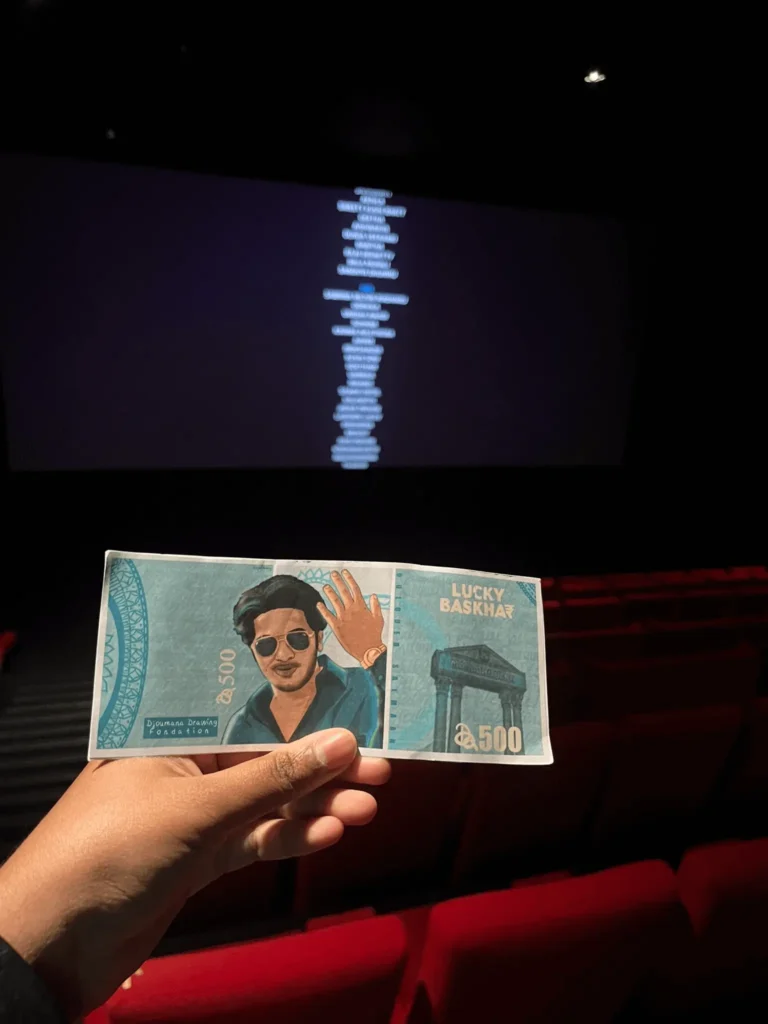If I were to define Lucky Baskhar in one word, it would be “cathartic.” Cathartic means nothing but that moment where you say, “My name is Maximus Decimus Meridius…” Lucky Baskhar follows the same path—the story of a middle-class bank employee who can’t even afford three pav bhajis from the streets of Mumbai, who becomes a billionaire in a couple of years. It’s not a one-man-show movie like Sivaji the Boss or Padayappa; rather, the credit must be shared between the team: Venky Atluri, Dulquer Salmaan, Nimish Ravi, and G.V. Prakash.

A High Octane Narrative by Venky Atluri
Honestly speaking, I don’t like preachy movies, so I was a little hesitant about this Venky Atluri venture. I expected it to be a better version of Vijay Devarakonda and Parasuram’s Family Star.
However, Venky surprised me with a well-balanced narrative filled with twists and turns. The thriller shade of the movie overpowered its middle-class hero glorification and preachy dialogues. Even the way he portrays some harsh truths is so classy and straight to the point—for example, dialogues like “I am not bad; I’m rich.”
Venky Atluri introduce his scenes like it’s from a pressure pump, building up tension in the audience and then with a twist, a sudden release—again, repeating this throughout the script until the climax. Normally, this pattern could make you bored, and by the climax, people might not feel the impact since they may start predicting things. But here, Venky shows brilliance in scripting; he covers up Baskhar’s cunningness with family drama and emotions so that the script ensures the audience won’t be skeptical about Baskhar’s actions. When Baskhar says, “It’s just begun,” he really means it. The second half shifts into top gear with family sentiments, thrills, emotions, and suspense.
A Con Thriller for Family Audience
So overall, Venky Atluri’s script is more like a Con thriller, with every other element acting as a cover-up. Another point I like about the script is that money laundering or stock market scams are not that easy to comprehend for a layman unless you are a fan of web series like Scam.
Here, Venky cleverly adds some overlapping shots where supporting characters explain things for you, so Baskhar’s sly moves become comprehensible even for those unfamiliar with the nuances of finance.
Dulquer Salmaan: Heart of the Film
It’s hard to imagine any other actor ( from Tollywood) pulling off this role with the ease Dulquer Salmaan does. His “boy-next-door” charm and physique make him a relatable character. DQ’s biggest plus is his “boy-next-door” look and physique.

His chest or arms aren’t like balloons, and he doesn’t have the headweight of a star. When he is humiliated, crying, we see a helpless middle-class family man, someone we know.
There’s a shot where he cries in the bathroom after almost losing everything—his dignity, his hope, his vehicle—and then switches with a smile. His ability to switch between helplessness and resilience ensures we empathise with his character. Venky’s objective of coating cunningness with innocence and justifying fraudulence with helplessness succeeds due to Dulquer’s screen presence and ease of acting.
Another big plus of Dulquer is he’s a great narrator. The movie progresses with DQ breaking the fourth wall and narrating, which is the icing on the cake.
Nimish Ravi’s Authentic Cinematic World
Cinematographer Nimish Ravi brilliantly captures the essence of 1990s Mumbai. Nowhere does the setting feel artificial, with the grey walls, crowded streets, and vada pav stalls giving an authentic backdrop.

In a period drama, the biggest challenge is making the setting believable. Nimish & Art team did a decent job here. It’s 1990s Mumbai, not because of some film posters but because of Nimish Ravi and art director Banglan (the art director of DQ’s Kurup).
G.V. Prakash Kumar’s Score – The Magic Touch
Pick any high or low moment in the film—when Baskhar faces an insult from a moneylender, or when he does a ₹6 million shopping spree and walks in slow motion—GVP makes sure you don’t have time to think about logic; just enjoy the magic on screen with your ears open. :).
GVP’s music keeps viewers entranced, amplifying the emotional highs and lows without letting them pause to question or be a detective to predict what’s next.
A Strong Role for Meenakshi Chaudhary
When it comes to the beautiful Meenakshi Chaudhary, I’m personally so happy to see her in a prominent role rather than roles where she’s just serving coffee to the hero or dancing with some uncles.
Her character, Sumathi, is strong, independent, and inspiring. It was well-written, and there are many scenes where she scores as an emotional anchor for Baskhar.
A Story That Resonates with the Middle-Class Dreams
Lucky Baskhar touches every middle-class man out there, and Venky successfully sells his dreams to that set audience. Overnight success with minimal consequence and a happy ending—what else does an average viewer want for satisfaction, at least for a day?

I appreciate how Venky shifts the perspective from “Fortune comes with risk” to “Fortune sustains when you know where to stop.” Most fortunes fall when people overestimate luck as skill.
Final Thoughts
In a world where only 2 million Indians (out of 1.428 Billion) belong to the high-income group (according to a 2021 Research report), Lucky Baskhar is bound to be a blockbuster.
It serves as a catharsis for everyone dreaming of overnight fortunes. Considering director Venky Atluri’s previous flicks like Vaathi or Rang De, in my opinion, Lucky Baskhar is the best.
Check out this week’s OTT releases here